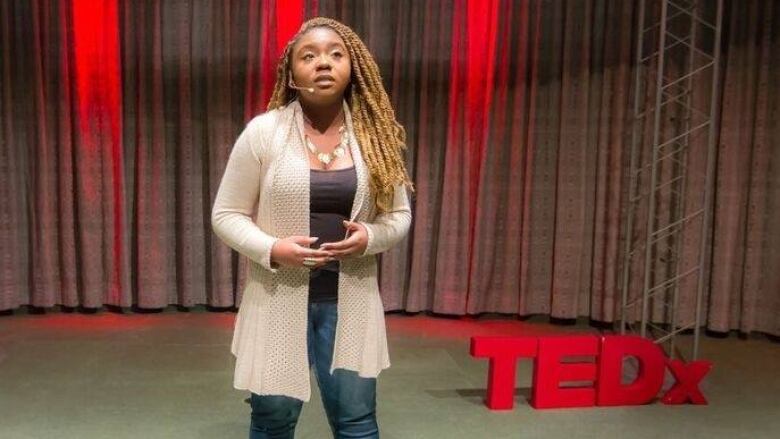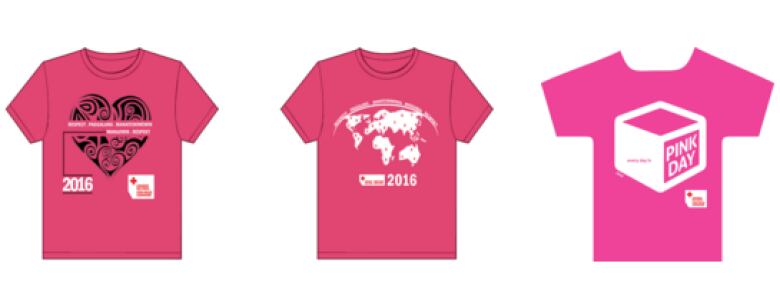On Pink Shirt Day, Winnipeg teen says schools must look at both sides of bullying
The perspective of the bully is equally as important as the perspective of the victim, Jayda Hope says

Winnipeg is brighter than usual on Wednesday as people put on pink shirts for aglobal initiative to stop bullying.
A 2009 Statistics Canadareport said one in three adolescents report being bullied in the country, but one River East Collegiate student said it's important to look at both sides of the issue the perspectives of both victim and bully.
Jayda Hope, 17, said she was bullied as an elementary school student and as she grew older, she bullied her peers. She spoke to CBC's Marcy Markusa about what she learned about bullying from her experiences, and what communities can do to fight it.

The bullying for you started in Grade 3, right? What was the nature of that?
In Grade 3 it was little ignorant comments from kids here and there, mainly about the colour of my skin. I was told a lot to, 'Go back where I came from'and things of that nature. As time went on, it was still about my skin but people got more clever with the way that they were telling me things. So, I wouldn't know it was them. In Grade 9 was the last real incident of bullying that I remember. It was on this social networking site called Ask.fm, where you can anonymously ask kids questions.
So, a question that I had received, it wasn't even a question, it was just someone saying something rude to me. It was, 'You're pretty, but you'd be prettier if you were white.'
How did you feel when you read that?
I didn't really know what to think or what to say I was hurt at the fact that someone would be able to say that to me and also hurt at the fact that I had no idea who it was. So, it could have been someone who I was close with, someone who I didn't know at all. I was disgusted at the fact that someone would be able to do anything like that, even though I had done things like that in the past.
Jayda, you're African-Canadian, right?
Yes.
Did you say that kids started telling you to, in your words, 'Go back to where you came from,' in Grade 3?
Yes I didn't really understand what they meant. Yes, I noticed my skin was brown but I was born here. My parents are immigrants, they came from Guyana and Trinidad but I was born here. This was the only home that I knew.
Did you talk to your parents about all of this?
No. They didn't know.
Why not?
I was kind of ashamed to tell them. I don't know why. I didn't like the fact that I was being victimized, I guess you couldsay. I didn't want to appear weak. That was my biggest thing during that time period from Grade 3 to Grade 9, my biggest thing was I didn't want to appear weak. So, I wouldn't tell people things. I wouldn't cry in front of people, I still don't like doing that. I just wouldn't show any real emotion so that I wouldn't appear weak to others or they wouldn't think of me as weak.
So, you were hiding this pretty good. Did any signs show? Sometimes people say, 'Watch the grades,' or 'Watch what's going on.'
No, which was surprising. My grades were intact, I remained a very good student. Teachers really didn't know they thought it was just a little attitude here, a little sass there from what they overheard. But, that was kind of like my way of lashing back, but no one really had any idea except for me and my peers.
So let's talk about that lashing back. You turned into a bit of a bully yourself. What happened and what was the turning point?
In Grade 5 was when I realized I really was a bully and then I started targeting kids. The cause of my actions was during that time my parents were going through a divorce. So, it was a hard time for me and my family and everyone involved, really. I had constantly been told to, 'Just stay strong.' But again to me, I perceived that as don't show any sign of weakness, which means don't ask for help.
So, I was hurting and bullying was my way of hoping someone would notice that I was acting weird and do something about it without me having to ask them for help.
So, how were you bullying other kids? What were you doing?
Mostly it was verbal but there was one incident where a group of kids were making fun of my parents' divorce and everything that was going on in my family life and he was sitting on this bar on the play structure and I pushed him off and he got a concussion.
So, I go to school with him now and we're okay. He says he doesn't even remember that incident but I remember it. That was the first time where I was like, 'I really just hurt someone.' And I hated that. He went to the hospital and then I didn't know if he was okay. I didn't really want to hurt anyone, I just wanted someone to notice that I was hurting.
So, how did you come to terms with all of this? Did you ultimately tell your parents about your own behavior as well?
They actually just heard about it for the first time in December, when I did my TEDx talk. That was the first time that I had really openly talked about any of this like, how I felt again through the years Grade 3 to [Grade] 9 with being bullied and then how I felt when I was a bully and then my struggle with mental health throughout that time period.
Tell us about your perspective on the big question: How can we prevent bullying?
The best way to prevent bullying is to start sharing all sides of it. Not just sharing the victim's side but also sharing what goes through the bully's mind when they're doing these things. Often it's not just because they just want to be mean, there's something deeper.
You have to let kids know that there are both sides and that if you have been bullied or if you're a bully you deserve the same amount of help.
You didn't tell anyone though for so many years. How do we get it out of you, you know what I mean?
Yeah. I don't know how people would have gotten it out of me in my situation. I would not tell anyone so if my peers would have told someone then that's how they would have found out. Other than that, there really is no way. At home, you have to look for little behavioural changes such as coldness, just being distant and rude.
Now, did you become that way when you were being bullied or when you were lashing out at others?
It was when I was lashing out at others is when that behaviour started to show.
What are you doing now to address bullying? I know you're quite a leader at your school, River East Collegiate.
In light of recent events with Cooper [Nemeth], we have pushed our [Pink Shirt Day] to April so, on that day we will be having an assembly.
We'll be talking to local organizations and businesses to see if they'd be willing to donate money or goods such as pink bracelets just so that everyone in our school can stand with those who have been bullied and those who are bullies but are looking for help and it's just not available.
At that assembly we'll be sharing all perspectives of bullying as well as hearing testimonies from bullies and the bullied.
Good. Good for you guys. Stay strong over there at River East.
Thank you.
The interview has been edited for clarity and length.












_(720p).jpg)


 OFFICIAL HD MUSIC VIDEO.jpg)
.jpg)



























































































